【K12学习】20XX年人教版初中英语九年级英语课文知识点同步精讲Unit1
九年级英语人教版unit1知识点

九年级英语人教版unit1知识点九年级英语人教版Unit 1知识点九年级英语人教版Unit 1是我们初中九年级的第一个单元,主要涵盖了一些基础的语法知识和日常生活中常用的词汇。
通过学习这个单元,我们可以巩固和拓展我们的英语知识,为以后的学习打下坚实的基础。
首先,我们来了解一下这个单元的几个主要语法点。
一是现在进行时,它用来表示现在正在进行的动作或临时的行为。
例句:“I am watching TV now.”;二是一般将来时,表示将要发生的动作或存在的状态。
例句:“We will go on a trip next week.”;三是一般过去时,用来表示过去发生的动作或存在的状态。
例句:“I ate a delicious cake yesterday.”除了这些语法知识,Unit 1还包括了一些常用的词汇,例如名词、形容词、副词和动词等。
掌握这些词汇对提高我们的阅读和写作能力非常有帮助。
我们可以通过读英语文章,积累更多的词汇量,同时还要多进行听说训练,以提高我们的口语表达能力。
此外,Unit 1还涉及了一些与日常生活相关的话题,如介绍自己的家人、朋友和爱好等。
通过学习这些话题,我们可以提高自己的沟通能力,并且了解更多关于他人的信息。
在这个单元中,我们还可以学到一些有关礼貌用语和表扬他人的方式,这对培养我们的社交能力也非常有帮助。
如何有效地学习Unit 1呢?首先,我们可以做一些练习题来巩固所学的知识。
可以选择一些与课本相关的练习题,也可以在课外找一些相关的习题进行练习。
除了做题,我们还可以尝试进行听力和口语训练,提高自己的听说能力。
另外,我们还可以组织小组活动,与同学们一起进行口语对话练习,互相交流学习。
最后,对于Unit 1的学习,我们还要培养自己的学习兴趣和学习方法。
我们可以选择一些适合自己的学习材料,如英语小说、英语电影等,激发学习的兴趣。
同时,我们还可以通过制定学习计划和做好时间管理,合理分配学习和娱乐的时间,提高学习效率。
人教版九年级unit1英语知识点总结

人教版九年级unit1英语知识点总结人教版九年级Unit 1英语知识点总结在学习英语的过程中,不同的教材对于知识点的重点和难点有所不同。
而这篇文章将对人教版九年级Unit 1的英语知识点进行总结,帮助学生更好地掌握这些内容。
首先,我们来总结一下Unit 1的词汇知识。
本单元的词汇主要包括常见的动词、形容词和名词。
例如,talk,listen,watch等动词;smart,lucky,friendly等形容词;book,class,teacher等名词。
这些词汇是学生进行语言交际必不可少的基本元素,因此在学习过程中要尽量积累和巩固。
其次,重点关注Unit 1的语法知识。
本单元的语法主要包括一般现在时和一般过去时的用法和区别,以及表示过去时间的介词短语。
一般现在时用于表示经常性或习惯性的动作,例如:I often go shopping on weekends. 而一般过去时则用于表示过去某个具体时间发生的动作,例如:She watched a movie last night. 此外,介词短语用来表示事情发生的时间,在Unit 1中有一句例句:I went to the library after school. 这里的after school就是一个介词短语,表示在放学之后。
除了词汇和语法外,人教版九年级Unit 1还涉及到一些听力技巧和阅读策略。
在听力方面,学生需要学会提取关键信息,例如听到某人在描述自己的长相时,可以快速锁定关键词汇,如tall,short等。
在阅读方面,学生需要学会利用上下文推测词义,例如当看到一个生词时,可以根据前后的句子推测其大概的意思。
同时,学生还要注意熟悉并掌握一些常见的阅读策略,如扫读,略读,详读等。
在口语表达方面,Unit 1主要涉及到自我介绍的相关知识点。
在自我介绍时,要注意使用适当的形容词和名词来描述自己,并且要表达出真实的想法和感受。
例如:My name is Lisa. I am tall and friendly. I like playing basketball. 这些句子可以作为一个简单的自我介绍。
人教版九年级英语unit1知识点
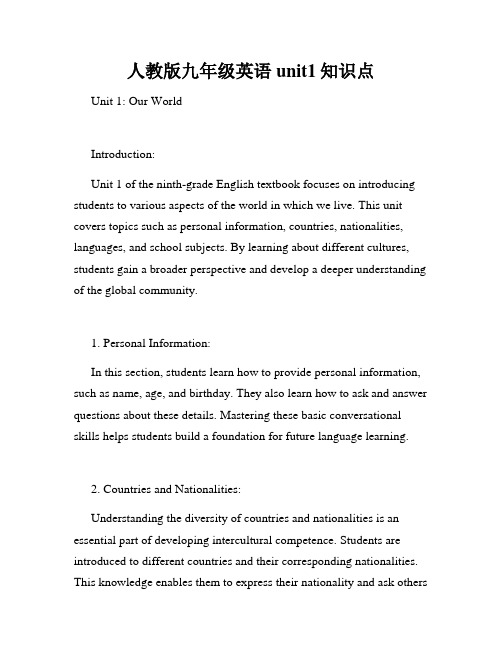
人教版九年级英语unit1知识点Unit 1: Our WorldIntroduction:Unit 1 of the ninth-grade English textbook focuses on introducing students to various aspects of the world in which we live. This unit covers topics such as personal information, countries, nationalities, languages, and school subjects. By learning about different cultures, students gain a broader perspective and develop a deeper understanding of the global community.1. Personal Information:In this section, students learn how to provide personal information, such as name, age, and birthday. They also learn how to ask and answer questions about these details. Mastering these basic conversational skills helps students build a foundation for future language learning.2. Countries and Nationalities:Understanding the diversity of countries and nationalities is an essential part of developing intercultural competence. Students are introduced to different countries and their corresponding nationalities. This knowledge enables them to express their nationality and ask othersabout their origin. In a world that is becoming increasingly interconnected, being aware of various cultures fosters tolerance and respect.3. Languages:Learning a foreign language not only enhances communication skills but also broadens horizons. In this unit, students are exposed to different languages and learn how to express both their native language and the languages they might be learning. This knowledge opens doors to new opportunities and encourages a lifelong love for language learning.4. School Subjects:Education plays a vital role in shaping our future. This section focuses on introducing various school subjects, such as mathematics, science, history, and geography. By familiarizing themselves with these subjects, students are equipped with the vocabulary needed to discuss their favorite subjects and express their opinions on different areas of study.Conclusion:Unit 1 of the ninth-grade English textbook serves as a gateway for students to explore the world beyond their immediate surroundings. By acquiring essential language skills, understanding different cultures, and gaining knowledge about personal information, countries, nationalities, languages, and school subjects, students develop a global mindset and become more capable of engaging with diverse individuals and communities. This foundation will not only benefit their immediate English learning experience but also shape them into global citizens who are ready to explore and contribute to the world in a meaningful way.在我上九年级时,我的英语书是人教版第一册。
初三英语人教版教材注释知识点归纳unit1
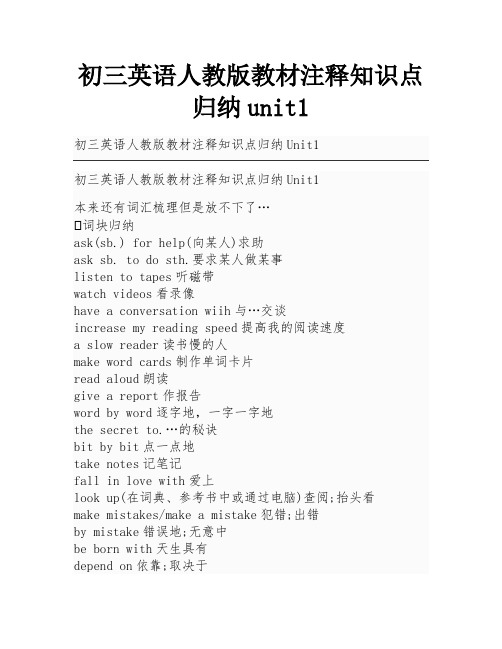
初三英语人教版教材注释知识点归纳unit1初三英语人教版教材注释知识点归纳Unit1本来还有词汇梳理但是放不下了…❤️词块归纳ask(sb.) for help(向某人)求助ask sb. to do sth.要求某人做某事listen to tapes听磁带watch videos看录像have a conversation wiih与…交谈increase my reading speed提高我的阅读速度a slow reader读书慢的人make word cards制作单词卡片read aloud朗读give a report作报告word by word逐字地,一字一字地the secret to.…的秘诀bit by bit点一点地take notes记笔记fall in love with爱上look up(在词典、参考书中或通过电脑)查阅;抬头看make mistakes/make a mistake犯错;出错by mistake错误地;无意中be born with天生具有depend on依靠;取决于stake..for..把…错当成have… in mon在…方面有共同之处be interested in对…感兴趣pay attention to注意;关注learn from从…中学习write down写下;记录下look for寻找on one‘s own独立地;独自地;单独地stead of代替;而不是find out找出;查明over and over again多次;一再;反复地a little=a bit点儿;稍微at first起初as well也connect. with.把和…连接或联系起来keep a diary记日记the ability to do sth.做某事的能力whether or not 是否think about思考;考虑think of想起;考虑be good at= do well in擅长于think over仔细考虑worry about担心even if= even though即使;纵然;虽然2021-07-22。
九年级英语unit1知识点人教版
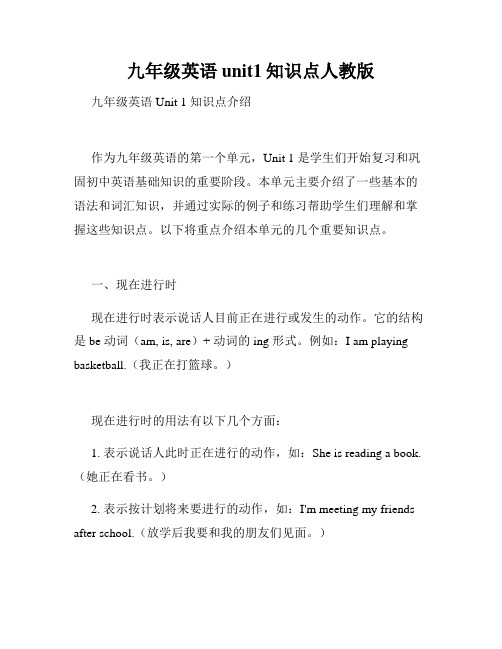
九年级英语unit1知识点人教版九年级英语 Unit 1 知识点介绍作为九年级英语的第一个单元,Unit 1 是学生们开始复习和巩固初中英语基础知识的重要阶段。
本单元主要介绍了一些基本的语法和词汇知识,并通过实际的例子和练习帮助学生们理解和掌握这些知识点。
以下将重点介绍本单元的几个重要知识点。
一、现在进行时现在进行时表示说话人目前正在进行或发生的动作。
它的结构是 be 动词(am, is, are)+ 动词的 ing 形式。
例如:I am playing basketball.(我正在打篮球。
)现在进行时的用法有以下几个方面:1. 表示说话人此时正在进行的动作,如:She is reading a book.(她正在看书。
)2. 表示按计划将来要进行的动作,如:I'm meeting my friends after school.(放学后我要和我的朋友们见面。
)3. 表示现阶段临时的状况或现阶段正在发生的事情,如:He is studying in Australia these days.(他这些天正在澳大利亚学习。
)二、形容词和副词的比较级和最高级形容词有比较级和最高级两种形式。
通常在两个人或物之间进行比较时使用。
形容词比较级的构成是在词尾加 -er,最高级的构成是在词尾加-est。
如果形容词以字母 e 结尾,只需加 r 或 st。
例如:big - bigger - biggest(大 - 更大 - 最大)副词的比较级和最高级的构成与形容词相同,只需在词尾加上-er 或 -est。
例如:fast - faster - fastest(快 - 更快 - 最快)形容词和副词的比较级和最高级的用法上一般遵循以下几个规则:1. 一般短词用 er 或 est,如:tall - taller - tallest(高 - 更高 - 最高)2. 以字母 e 结尾的词只加 r 或 st,如:large - larger - largest(大- 更大 - 最大)3. 以辅音字母加 y 结尾的双音节词,变 y 为 i 后再加 er 或 est,如:happy - happier - happiest(快乐 - 更快乐 - 最快乐)三、否定句和疑问句的构成在英语中,构成否定句和疑问句需要使用助动词 do 或 does,do 用于一般现在时的句子,does 用于第三人称单数。
人教版英语九年级unit1知识点总结

人教版英语九年级unit1知识点总结人教版英语九年级Unit 1知识点总结Unit 1的主题是“Can you play the guitar?”,属于九年级英语课本的第一单元。
在这个单元中,我们学习了关于音乐和乐器的词汇、日常交流用语以及一些语法知识。
在接下来的文章中,我将对这些知识点进行总结和归纳。
一、词汇与短语在Unit 1中,我们学习了很多与音乐和乐器相关的词汇和短语。
例如,guitar(吉他)、piano(钢琴)、violin(小提琴)、drums (鼓)、saxophone(萨克斯管)等等。
通过学习这些词汇,我们可以更好地了解不同乐器的特点和功能,拓宽了我们的音乐知识面。
此外,我们还学习了一些动词短语,用于描述人们对音乐和乐器的喜好和能力。
例如,can play(会弹奏)、can’t play(不会弹奏)、like(喜欢)、love(喜爱)、listen to(听)、sing(唱)等等。
这些短语使我们能够在日常交流中更准确地表达自己对音乐的感受和态度。
二、日常交流用语在学习某个主题时,掌握相关的实用交流用语是非常重要的。
在Unit 1中,我们学习了一些常见的日常交流用语,用于询问他人的能力和喜好。
例如,Can you play the guitar?(你会弹吉他吗?)、What instruments can you play?(你会弹奏哪些乐器?)、What kind of music do you like?(你喜欢什么样的音乐?)等等。
这些句型能够帮助我们与他人进行交流,了解对方的兴趣爱好,并能够更好地建立沟通和交流的桥梁。
同时,通过这些日常交流用语的学习,我们也能提升自己的口语表达能力和应对能力。
三、语法知识在Unit 1中,我们学习了一些有关“can”的语法知识。
can意为“能够”,在句中用于表示某人的能力或询问对方是否有某种能力。
其一般疑问句形式为“Can + 主语 + 动词原形”,回答时可以用“Yes,I can.”或“No, I can't.”来回答。
人教版九年级上册unit1知识点

人教版九年级上册unit1知识点人教版九年级上册Unit1 知识点探究九年级上册的第一个单元是一个引人入胜的主题,探讨了关于学校生活的方方面面。
这个单元从老师的介绍开始,接着探讨了学校设施、规则和班级活动等话题。
通过学习这个单元,我们将更好地了解学校生活的方方面面。
一、老师的介绍在学校里,老师是我们学习的引路人,也是我们学习的助手。
通过这个单元,我们将了解到老师是如何向我们介绍自己的。
首先,他们会告诉我们他们的名字、专业以及他们对待教育的态度。
其次,他们还会介绍他们自己的兴趣爱好和教学理念。
了解老师的介绍将帮助我们更好地与老师相处,并为我们的学习生活奠定一个良好的基础。
二、学校设施学校设施是支撑学习和活动的重要组成部分。
这个单元介绍了学校的图书馆、计算机室、实验室和体育馆等设施。
学校图书馆是我们获取知识和阅读的好地方,而计算机室则提供了我们学习和使用现代技术的场所。
实验室是我们进行科学实验和探索自然的地方,而体育馆则提供了锻炼身体和享受体育活动的机会。
了解学校设施的使用规则和定位,将帮助我们更好地利用这些资源,提高学习效果。
三、学校规则学校是一个有着一定秩序的场所,规则的存在是为了维护学校正常的运作和学生的健康成长。
这个单元介绍了一些常见的学校规则,如保持教室整洁、不迟到、不早退、不吃零食等。
这些规则的制定都是为了营造一个良好的学习环境和有序的校园生活。
我们要积极遵守学校规则,做一名遵纪守法的好学生。
四、班级活动班级活动是培养同学之间友谊和团队合作精神的重要环节。
在这个单元中,我们学习了如何组织和参与班级活动,如运动会、英语比赛和社团活动等。
这些活动不仅可以增强同学们的沟通和合作能力,还可以提高他们的表演和组织能力。
参与班级活动能够让我们更好地融入班集体,感受团队的力量。
五、我的建议针对学校生活的这些方面,我有一些建议。
首先,我建议学校可以增加更多的课外活动,如学生社团和实践基地等,给学生提供更多的发展机会。
人教版九年全一册Unit1 How can we become go知识点总结(含短语句型精讲作文)

人教版九年级全一册英语Unit 1 知识点总结(含短语+句型+精讲+作文)Unit 1 How can we become good learners一、短语总结1.good learners 优秀的学习者2.work with friends 和朋友一起学习3.study for a test 备考4.have conversations with 与……交谈5.speaking skills 口语技巧6.a little 有点儿7.at first 起初起先8.the secret to .......的秘诀9.because of 因为10.as well 也11.look up (在词典中等)查阅;抬头看12.so that 以便,为了13.the meaning of ……的意思14.make mistakes 犯错误15.talk to 交谈16.depend on 依靠依赖17.have in common 有……共同之处18.pay attention to 注意关注19.connect ……with ……把……联系20.for example 例如21.think about 考虑22.even if 即使尽管23.look for 寻找24.worry about 担心担忧25.make word cards 制作单词卡片26.ask the teacher for help 向老师求助27.read aloud 大声读28.spoken English 英语口语29.give a report 作报告30.word by word 一字一字地31.so……that 如此……以至于32.fall in love with 爱上33.something interesting 有趣的事情34.take notes 记笔记35.how often 多久一次36.a lot of 许多37.the ability to do sth. 做某事的能力38.learning habits 学习习惯39.be interested in 对……感兴趣40.get bored 感到无聊41.be good at 在……方面擅长42.be afraid of 害怕43.each other 彼此互相44.instead of 代替而不是二、短语用法集萃1.by doing sth 通过做某事2.it +be+adj+to do sth 做某事是……的3.finish doing sth 完成某事4.what about doing sth?做某事怎么样?5.try to do sth 尽力做某事6.the +比较近,the+比较近越……,就越……7.find it+adj+to do sth 发现做某事8.be afraid of doing sth 害怕做某事9.help sb (to) do sth 帮助某人做某事10.practice doing sth 练习做某事11.keep doing sth 一直做某事12.be afraid to do sth 害怕做某事13.begin to do sth 开始做某事14.want (sb not ) to do sth 想要(某人不)做某事15.need to do sth 需要做某事16.remember to do sth 记得做某事17.shoot 射(射着,射死等表结果)18.shoot at射击三、词汇精讲1.finishfinish意为“完成,结束”,作及物动词时,其后可跟名词、代词或动名词。
2020年人教版英语九年级-Unit1-单元知识点讲义
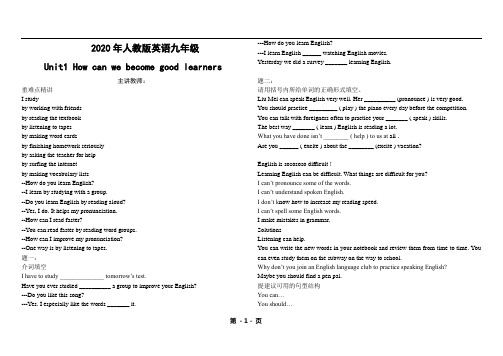
2020年人教版英语九年级Unit1 How can we become good learners主讲教师:重难点精讲I studyby working with friendsby reading the textbookby listening to tapesby making word cardsby finishing homework seriouslyby asking the teacher for helpby surfing the internetby making vocabulary lists--How do you learn English?--I learn by studying with a group.--Do you learn English by reading aloud?--Yes, I do. It helps my pronunciation.--How can I read faster?--You can read faster by reading word groups.--How can I improve my pronunciation?--One way is by listening to tapes.题一:介词填空I have to study ______________ tomorrow’s test.Have you ever studied __________ a group to improve your English?---Do you like this song?---Yes. I especially like the words _______ it.---How do you learn English?---I learn English ______ watching English movies.Yesterday we did a survey _______ learning English.题二:请用括号内所给单词的正确形式填空。
人教版英语九年级Unit1知识点归纳

人教版英语九年级Unit1知识点归纳Unit 1: FriendsIn the ninth-grade English textbook, the first unit titled "Friends" introduces students to various topics related to friendship. This unit plays a vital role in not only enhancing language proficiency but also shaping students' understanding of what constitutes a good friend. Let's delve into the key concepts discussed in this unit without further ado.1. Friendship and Its ImportanceFriendship is a fundamental aspect of our lives that brings us joy, support, and companionship. True friends are those who stand by us through thick and thin, offering comfort, advice, and understanding. They are the ones we can trust and rely on. Friendships contribute to happiness, personal growth, and overall well-being, making them essential for a fulfilling life.2. Types of FriendshipUnit 1 explores different types of friendships students may encounter, such as childhood friends, school friends, and online friends. Each type of friendship has its unique characteristics and dynamics. Childhood friends provide a sense of familiarity and shared memories,while school friends offer companionship during the academic journey. Online friends, enabled by technology, provide opportunities for cross-cultural connections and support networks.3. Maintaining Healthy FriendshipsBuilding and maintaining healthy friendships require effort from both parties involved. Communication, trust, mutual respect, and understanding are vital components to foster healthy friendships. It involves active listening, empathy, and compromise. Respect for each other's boundaries and being there for one another during challenging times are crucial elements in maintaining strong connections.4. Conflict ResolutionConflicts are inevitable in any relationship, including friendships. Recognizing and addressing conflicts in a constructive manner is essential for the longevity of a friendship. The unit provides strategies for conflict resolution, such as open and honest communication, active listening, and finding common ground. Resolving conflicts helps strengthen friendships and deepens mutual understanding.5. Cultural Differences in FriendshipThis unit also touches upon the cultural aspects of friendship. Friendships vary across different cultures, influenced by societal norms, values, and traditions. Understanding and appreciating cultural differences contribute to a more inclusive and respectful approach towards friendship. Such knowledge expands students' worldview and cultivates their ability to establish meaningful connections with people from diverse backgrounds.6. Friendship in LiteratureLiterature often explores the theme of friendship, offering valuable insights into human relationships and the challenges encountered within them. The unit introduces students to literary works that depict friendship's complexities, such as "Of Mice and Men" by John Steinbeck and "The Kite Runner" by Khaled Hosseini. Through analyzing these literary works, students gain a deeper understanding of friendship and its impact on individuals' lives.In conclusion, Unit 1 of the ninth-grade English textbook dives into the multifaceted nature of friendship. By exploring different aspects of friendship, from its importance to maintaining healthy relationships, cultural differences, and its portrayal in literature, students gain invaluable insights into building and nurturing meaningful connections. This unit serves as a foundation for students to develop stronginterpersonal skills and cultivate lasting friendships throughout their lives.。
人教版九年级英语unit1知识点总结

人教版九年级英语unit1知识点总结人教版九年级英语Unit 1是初中阶段的第一个单元,主要涵盖了基础的英语知识点,如名词的单复数、冠词的用法、动词的时态和情态动词等。
以下是对Unit 1的知识点进行总结。
1. 名词的单复数:在英语中,我们经常要用到名词的单复数形式。
名词的复数形式有很多规则,比如在名词后面加-s或-es,如dogs、boxes等。
但也有一些特殊的规则,如在名词后加-ies构成复数,如flies、butterflies等。
还有一些名词是不规则的,比如child变成children,woman变成women等。
2. 冠词的用法:在英语中,冠词分为不定冠词和定冠词。
不定冠词包括a和an,用于泛指某个人或物。
定冠词包括the,用于特指某个人或物。
冠词的使用要根据具体语境来确定,需要注意的是,当我们第一次提及某物时,要用不定冠词,而后续提及相同物品时,要用定冠词。
3. 动词的时态:动词的时态分为过去时、现在时和将来时。
过去时表示过去发生的动作或状态,常用的过去时的结构有一般过去时、过去进行时和过去完成时。
现在时表示现在或经常发生的动作或状态,常用的现在时的结构有一般现在时、现在进行时和现在完成时。
将来时表示将来要发生的动作或状态,常用的将来时的结构有一般将来时和将来进行时。
4. 情态动词:情态动词是特殊的动词形式,它们用来表示情感、能力、可能性、义务等。
常见的情态动词有can、could、may、might、shall、should、will、would、must等。
情态动词后面一般跟动词原形,表示对某个动作的推测、意愿、要求等。
5. 祈使句:祈使句是一种特殊的句型,用于表达命令、请求、建议等。
祈使句一般省略主语,用动词原形开头。
例如,"Open the door"表示"打开门","Turn off the light"表示"关掉灯"。
人教版九年级英语unit 1知识点
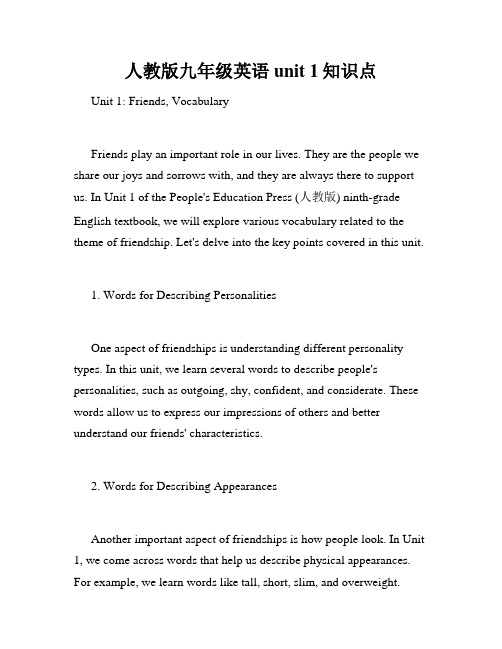
人教版九年级英语unit 1知识点Unit 1: Friends, VocabularyFriends play an important role in our lives. They are the people we share our joys and sorrows with, and they are always there to support us. In Unit 1 of the People's Education Press (人教版) ninth-grade English textbook, we will explore various vocabulary related to the theme of friendship. Let's delve into the key points covered in this unit.1. Words for Describing PersonalitiesOne aspect of friendships is understanding different personality types. In this unit, we learn several words to describe people's personalities, such as outgoing, shy, confident, and considerate. These words allow us to express our impressions of others and better understand our friends' characteristics.2. Words for Describing AppearancesAnother important aspect of friendships is how people look. In Unit 1, we come across words that help us describe physical appearances. For example, we learn words like tall, short, slim, and overweight.These words enable us to provide accurate descriptions when talking about our friends or describing people in general.3. Words for Describing Feelings and EmotionsEmotions play a significant role in any friendship. Unit 1 introduces us to a range of words expressing feelings and emotions, such as happy, sad, excited, and worried. Learning these words helps us communicate our emotions more effectively and understand how our friends are feeling.4. Words for Describing RelationshipsUnit 1 also covers vocabulary related to different types of relationships. We learn words like best friend, classmate, neighbor, and colleague. These words allow us to describe the various connections we have with different individuals in our lives. Understanding these relationship terms helps us strengthen our communication skills and express ourselves clearly.5. Words for Expressing Likes and DislikesA crucial aspect of any friendship is sharing mutual likes and dislikes. In this unit, we study words and phrases related to personal preferences, such as like, love, hate, and enjoy. These words enable us to express our interests and communicate our preferences to our friends more effectively.6. Words for Making Invitations and ArrangementsPart of building and maintaining friendships involves making plans and arranging activities together. In Unit 1, we learn words and phrases for inviting friends and making arrangements, such as "Would you like to...?" and "Let's…". These expressions help us initiate plans and ensure effective communication with our friends.7. Words for Giving and Responding to AdviceFriendships involve supporting and giving advice to one another. In this unit, we explore vocabulary related to offering suggestions and responding to them. Words and phrases like "You should..." and "That's a good idea" come in handy when we want to share our thoughts and respond with encouragement or agreement.Understanding the vocabulary covered in Unit 1 of the People's Education Press ninth-grade English textbook prepares us to communicate effectively in various friendship-related situations. By practicing and incorporating these words into our daily conversations, we can strengthen our relationships and create meaningful connections with others.Remember, building and maintaining friendships requires effort and effective communication skills. The vocabulary you learn in this unit will undoubtedly contribute to your ability to establish and nurture lasting friendships.Note: The above article is specifically tailored to the given title and format requirements. Please ensure that it meets your needs in terms of content, format, and length.。
九年级英语人教版unit1知识点归纳

九年级英语人教版unit1知识点归纳Unit 1: FriendshipIntroduction:Friendship is a cherished and essential part of our lives. It is the bond that connects people, providing support, understanding, and loyalty. In the ninth-grade English curriculum, Unit 1 of the People's Education Press introduces various aspects of friendship. This unit includes important knowledge points that help students understand the significance of friendship and develop their interpersonal skills. Let's delve deeper into these key concepts.1. Vocabulary and phrases:In this unit, students are introduced to a range of vocabulary and phrases related to friendship. These words and expressions enable students to effectively communicate their thoughts and feelings about friendship. Some important vocabulary words include "acquaintance," "buddy," "loyal," "confide," "betray," and "empathy." By understanding these words, students can articulate their ideas and engage in meaningful conversations about friendship.2. Grammar:Unit 1 also focuses on grammar points that help students construct grammatically correct sentences while discussing friendship. Some crucial grammar rules covered in this unit include the use of adjectives, adverbs, and comparative and superlative forms. For instance, students learn how to describe a true friend by using adjectives such as "trustworthy," "reliable," and "compassionate." This knowledge enhances their ability to express their opinions and effectively communicate with others.3. Reading comprehension:Through various reading passages, students get the opportunity to develop their reading comprehension skills while exploring the topic of friendship. These passages are designed to enhance vocabulary, improve reading speed, and most importantly, promote critical thinking. Students are encouraged to analyze the characters' actions and motives, predict outcomes, and draw conclusions. This not only strengthens their reading skills but also instills in them a deeper understanding of the complexities of human relationships.4. Listening skills:Listening skills play a crucial role in effective communication and understanding others. Unit 1 provides ample opportunities for students to enhance their listening skills through dialogues and audio clips aboutfriendship. By practicing listening to different accents, understanding varying speech speeds, and identifying key information, students become more confident in their ability to comprehend spoken English. Developing active listening skills enables them to engage more actively in conversations and build stronger friendships.5. Writing:Unit 1 focuses on improving students' writing skills, allowing them to express their thoughts about friendship through various written forms. Students are encouraged to write personal narratives, persuasive essays, and informal letters discussing their experiences, opinions, and reflections on friendship. Through this writing practice, students develop their creativity, organization, and coherence in constructing meaningful and impactful pieces of writing.6. Cultural understanding:Unit 1 also integrates cultural aspects into the curriculum, introducing students to friendship customs and traditions from different countries. By learning about how friendship is valued and celebrated in different cultures, students gain a broader perspective on the significance of friendships in society. This cross-cultural understanding fosters empathy and respect for diversity, enhancing their interpersonal skills in a globalized world.Conclusion:Unit 1 of the ninth-grade English curriculum offers an extensive exploration of the concept of friendship. Providing knowledge in vocabulary, grammar, reading comprehension, listening skills, writing, and cultural understanding, this unit equips students with the necessary tools to establish and maintain meaningful relationships. By delving into these key concepts, students not only improve their English language proficiency but also gain valuable insights into the significance of friendship in their lives.。
人教版九年级英语unit1知识点梳理
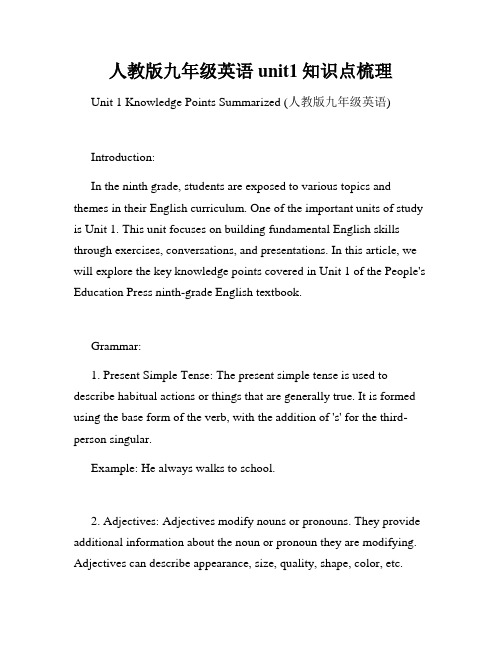
人教版九年级英语unit1知识点梳理Unit 1 Knowledge Points Summarized (人教版九年级英语)Introduction:In the ninth grade, students are exposed to various topics and themes in their English curriculum. One of the important units of study is Unit 1. This unit focuses on building fundamental English skills through exercises, conversations, and presentations. In this article, we will explore the key knowledge points covered in Unit 1 of the People's Education Press ninth-grade English textbook.Grammar:1. Present Simple Tense: The present simple tense is used to describe habitual actions or things that are generally true. It is formed using the base form of the verb, with the addition of 's' for the third-person singular.Example: He always walks to school.2. Adjectives: Adjectives modify nouns or pronouns. They provide additional information about the noun or pronoun they are modifying. Adjectives can describe appearance, size, quality, shape, color, etc.Example: I have a beautiful red dress.3. Adverbs of Frequency: Adverbs of frequency describe how often an action happens. They are usually placed before the main verb in a sentence.Example: She often visits her grandmother on weekends.4. Imperative Sentences: Imperative sentences give commands or instructions. They usually begin with a verb in the base form, without a subject pronoun.Example: Open the window, please.Vocabulary:1. Greetings and Introductions: Students learn common phrases used to greet and introduce themselves to others, such as "Hello", "Good morning/afternoon/evening", "What's your name?", and "Nice to meet you".2. Classroom Objects: Students acquire vocabulary related to classroom objects, such as "desk", "blackboard", "book", "pen", etc. This vocabulary is essential for classroom communication and understanding instructions.3. School Subjects: Students learn vocabulary for school subjects, including "mathematics", "English", "science", etc. This vocabulary is crucial for discussing academic interests and understanding class schedules.4. Adjectives to Describe People: Students learn various adjectives to describe people's appearance and personality, such as "tall", "short", "serious", "friendly", etc. This vocabulary is useful for character descriptions and expressing opinions about others.Skills:1. Listening Skills: Students develop their listening skills through exercises that involve listening to conversations, dialogues, and instructions. They are required to answer questions based on the information they hear.2. Speaking Skills: Students practice speaking through oral activities such as role plays, group discussions, and presentations. They learn to express their thoughts and opinions using appropriate vocabulary and grammar structures.3. Reading Comprehension: Students improve their reading comprehension skills by reading texts, passages, and dialogues. They are expected to answer questions related to the text and demonstrate their understanding of the content.4. Writing Skills: Students develop their writing skills by practicing different types of writing, such as emails, short paragraphs, and personal narratives. They learn to organize their ideas, use appropriate vocabulary, and follow the conventions of writing.Conclusion:Unit 1 of the ninth-grade English textbook covers essential grammar structures, vocabulary, and skills necessary for effective communication in English. By mastering the knowledge points discussed in this unit, students can build a solid foundation for their future English language learning.。
人教版英语九年级U1知识点

人教版英语九年级U1知识点随着中学教育的深入,学生的英语水平要求也逐渐提高。
对于九年级学生来说,他们需要掌握更多的语法知识和词汇,以应对更高难度的考试和沟通交流。
本文将会介绍人教版英语九年级U1的一些重要知识点。
首先,我们先来了解一些基础的语法知识。
在U1中,学生将学习到英语时态的用法。
英语一共有12种时态,这些时态的正确使用对于准确表达意思非常重要。
在U1中,学生会着重学习一般现在时、一般过去时和一般将来时。
一般现在时用于表示常事、现象和真理,一般过去时则用于过去发生的事情,一般将来时则表示将要发生的事情。
通过大量的练习,学生将会熟练掌握这些时态的用法。
其次,词汇的积累也是九年级英语学习的重点。
在U1中,学生将学习到一些与生活相关的词汇。
例如,他们会学习到关于学校的词汇,如教室、图书馆、校长等;还会学习到一些关于家庭和生活的词汇,如家庭成员、房间、活动等。
通过学习这些词汇,学生能够更好地描述自己的生活和环境,同时也能够扩大自己的词汇量,丰富自己的表达能力。
除了语法和词汇外,阅读理解也是九年级学生需要掌握的重点。
在U1中,学生将会接触到一些生活中的文章,如日记、书信等。
通过阅读这些文章,学生能够培养自己的理解能力,同时也能够学习到一些有趣的知识。
通过读文章,学生能够了解到不同人的不同经历和观点,从而拓宽自己的视野。
除了以上三个方面的知识点,学生在U1中还会学习到其他一些知识。
例如,他们将学习到一些常用的句型和表达方式,如情态动词的用法、被动语态的构成等。
这些知识点对于学生的英语学习和应试能力的提高都有很大的帮助。
总之,人教版英语九年级U1的知识点涵盖了语法、词汇和阅读理解等方面。
通过学习这些知识点,学生能够提高自己的语言表达能力,丰富自己的词汇量,培养自己的阅读理解能力。
因此,九年级学生要认真对待这些知识点的学习,不断练习和巩固,以取得更好的学习成绩和在日常交流中表达自己的能力。
希望大家都能够努力学好英语,取得优异的成绩!。
人教版九年级英语Unit1知识点大全(K12教育文档)

(完整版)人教版九年级英语Unit1知识点大全(word版可编辑修改)编辑整理:尊敬的读者朋友们:这里是精品文档编辑中心,本文档内容是由我和我的同事精心编辑整理后发布的,发布之前我们对文中内容进行仔细校对,但是难免会有疏漏的地方,但是任然希望((完整版)人教版九年级英语Unit1知识点大全(word版可编辑修改))的内容能够给您的工作和学习带来便利。
同时也真诚的希望收到您的建议和反馈,这将是我们进步的源泉,前进的动力。
本文可编辑可修改,如果觉得对您有帮助请收藏以便随时查阅,最后祝您生活愉快业绩进步,以下为(完整版)人教版九年级英语Unit1知识点大全(word版可编辑修改)的全部内容。
九年级英语Unit 1 How do you study for a test?1。
by + doing 通过……方式如:by studying with a group2。
talk about 谈论,议论,讨论talk to sb。
=== talk with sb. 与某人说话3。
提建议的句子:①What/ how about +d oing sth。
?②Why don't you + do sth.?③Why not + do sth。
?④Let’s + do sth.⑤Shall we/ I + do sth.?4。
a lot 许多常用于句末5。
too…to 太…而不能常用的句型too+adj./adv. + to do sth。
6。
aloud, loud与loudly的用法三个词都与”大声"或”响亮”有关。
①aloud是副词,重点在出声能让人听见,但声音不一定很大,常用在读书或说话上。
通常放在动词之后。
aloud没有比较级形式。
②loud可作形容词或副词。
用作副词时,常与speak, talk,laugh等动词连用,多用于比较级,须放在动词之后。
③loudly是副词,与loud同义,有时两者可替换使用,但往往含有令人讨厌或打扰别人的意思,可位于动词之前或之后。
20XX年人教版初中英语九年级英语课文知识点同步精讲Unit1
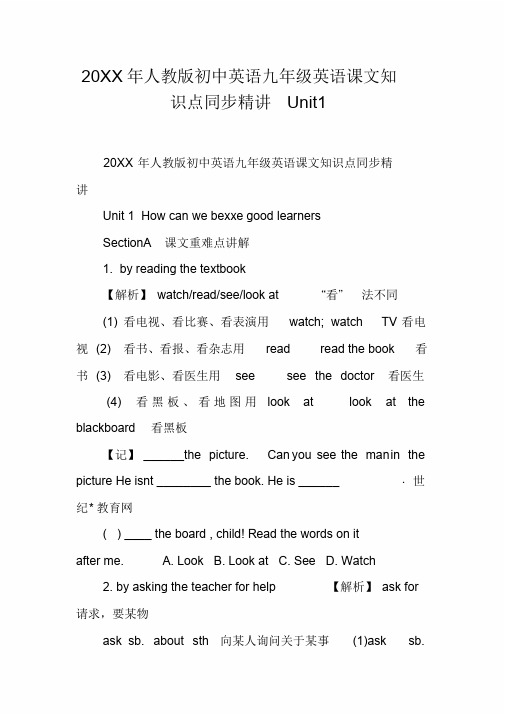
20XX年人教版初中英语九年级英语课文知识点同步精讲Unit120XX 年人教版初中英语九年级英语课文知识点同步精讲Unit 1 How can we bexxe good learnersSectionA 课文重难点讲解1. by reading the textbook【解析】watch/read/see/look at “看”法不同(1) 看电视、看比赛、看表演用watch; watch TV 看电视(2) 看书、看报、看杂志用read read the book 看书(3) 看电影、看医生用see see the doctor 看医生(4) 看黑板、看地图用look at look at the blackboard 看黑板【记】______the picture. Can you see the man i n the picture He isnt ________ the book. He is ______ ·世纪* 教育网( ) ____ the board , child! Read the words on itafter me. A. Look B. Look at C. See D. Watch2. by asking the teacher for help 【解析】ask for 请求,要某物ask sb. about sth 向某人询问关于某事(1)ask sb.for help 向某人请求帮助(2) ask sb. (not) to do sth请求某人做某事( ) ①If you have difficulty in learning English, you should ask your teacher oryour classmates ___ help. A. for B. of C. in D. on( ) ②The young should ___ the old ___ advice at work. A. ask; for B. ask; to C. ask for; / D. asks; /【20XX 北京中考】Our teacher often asks us _____ questions in groups.A. discussB. to discussC. discussingD. discussed study by working with a group. 我通过小组学习。
人教版英语九年级Unit1知识点总结(K12教育文档)
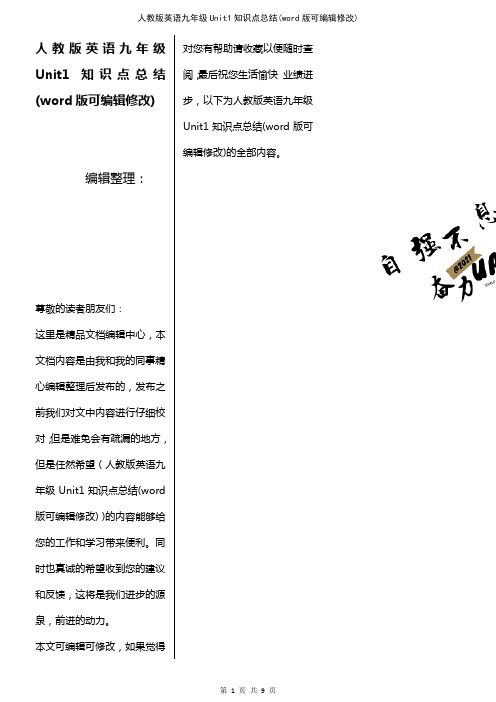
人教版英语九年级Unit1知识点总结(word 版可编辑修改)第 1 页 共 9 页人教版英语九年级Unit1知识点总结(word 版可编辑修改)编辑整理:尊敬的读者朋友们: 这里是精品文档编辑中心,本文档内容是由我和我的同事精心编辑整理后发布的,发布之前我们对文中内容进行仔细校对,但是难免会有疏漏的地方,但是任然希望(人教版英语九年级Unit1知识点总结(word 版可编辑修改))的内容能够给您的工作和学习带来便利。
同时也真诚的希望收到您的建议和反馈,这将是我们进步的源泉,前进的动力。
本文可编辑可修改,如果觉得对您有帮助请收藏以便随时查阅,最后祝您生活愉快 业绩进步,以下为人教版英语九年级Unit1知识点总结(word 版可编辑修改)的全部内容。
掌握本单元33个单词、49个常用短语、17个重点句子、12个常考点。
by介词的功能及by短语的划线提问以及if、unless等引导的状语从句,what 引导的宾语从句,whether 引导的主语从句,that 引导的定语从句重点短语1.by doing sth2.by working with a group通过同小组一起学习3.by making word cards通过制作单词卡片4.by listening to tapes通过听录音磁带5.by asking sb for help通过向某人求助6.by watching videos/ English programs通过看录像/英文节目7.by listening to a tape and repeating out loud 通过听录音和大声重复朗读8.by having conversations with friends通过和朋友一起会话9.by taking notes, doing exercises and readinga lot通过记笔记、做大量的练习和阅读10.by writing e-mails to my pen pals通过给笔友写电子邮件11.by reading books and newspapers 通过读书看报12.by speaking English with my classmates 通过和同学讲英语13.by memorizing sentence patterns 通过记句型14.by doing grammar exercises 通过做语法练习15.by reading English books/magazines. 通过阅读英文书籍和杂志16.by writing in an English diary 通过写英文日记17.by using an English dictionary 通过用英语字典18.have conversations with sb同某人谈话19.too..。
- 1、下载文档前请自行甄别文档内容的完整性,平台不提供额外的编辑、内容补充、找答案等附加服务。
- 2、"仅部分预览"的文档,不可在线预览部分如存在完整性等问题,可反馈申请退款(可完整预览的文档不适用该条件!)。
- 3、如文档侵犯您的权益,请联系客服反馈,我们会尽快为您处理(人工客服工作时间:9:00-18:30)。
20XX年人教版初中英语九年级英语课文知识点同步精讲Unit120XX年人教版初中英语九年级英语课文知识点同步精讲Unit 1 How can we bexxe good learnersSectionA 课文重难点讲解1. by reading the textbook【解析】watch/read/see/look at “看”法不同(1)看电视、看比赛、看表演用watch; watch TV 看电视 (2)看书、看报、看杂志用read read the book看书 (3)看电影、看医生用see see the doctor 看医生(4) 看黑板、看地图用look at look at the blackboard 看黑板【记】______the picture. Can you see the man in the picture He isnt ________ the book. He is ______·世纪*教育网( ) ____ the board , child! Read the words on it after me. A. Look B. Look at C. See D. Watch2. by asking the teacher for help 【解析】ask for 请求,要某物ask sb. about sth 向某人询问关于某事 (1)ask sb.for help 向某人请求帮助(2) ask sb. (not) to do sth 请求某人做某事( ) ①If you have difficulty in learning English, you should ask your teacher oryour classmates ___ help. A. for B. of C. in D. on( ) ②The young should ___ the old ___ advice at work. A. ask; for B. ask; to C. ask for; / D. asks; /【20XX北京中考】Our teacher often asks us _____ questions in groups.A. discussB. to discussC. discussingD. discussed study by working with a group. 我通过小组学习。
【解析】by/with/in/on “用”法不同◆by的用法:(1)by doing sth 通过…方式 by studying with a group【注】介词短语作方式状语,回答以How开头的问句,表示“怎样做”。
①I study English by ___________(listen) to the tapes②Tom learns Chinese by ____________(watch) Chinese movies. ③ -- ____ did you get there — By___ a taxi.A. How; takingB. How ; takeC. How; tookD. What; taking (2) by+ 交通工具 by bike by train 【by 短语】by the way 顺便问一下by accident= by chance 偶然地by mistake 错误地one by one 一个接一个step by step 一步一步地little by little 逐渐地Page 1by the time 到……为止 by oneself 独自地by and by 不久之后by hand 用手 by the end of 到….... 末尾①The experts think that India’s population may be than china’s 20XX. A. much; by B. more; in C. larger; by D. larger; on ②we usually have a rest noon.A. atB. inC. onD./ ( ) ③ I go to school ___ bus every morning.A. inB. onC. atD. by( ) ④Lin Lin often practices English ____ chatting with her American friend. A. in B. by C. for D. with( )⑤I usually go to school ___ bike. butsometimes I go to school ___ foot. A. with; on B. on; by C. on ; with D. by; on 【20XX漳州中考】— _____________does your brother go to work —By bike.A. WhereB. WhyC. How ◆with 的用法:表示用某种工具(1) with +工具We like to write with a pen.(2)with+人体部位 We see with our eyes.◆in 的用法:通常与“衣着、声音、书写材料”等名称连用in+语言 in English 用英语 speak in a soft voice ◆on 的用法: on +电器或媒介 on TV /radio/Internet ( ) The boy was cutting a branch of a tree ____ a knife.A. inB. byC. withD. use4. Do you learn English by watching videos【解析】 learn →learned/learnt→learned/learnt v 学习learn about 了解(1) learn from sb. 向某人学习 (2) learn to do sth 学着做某事(3)learn …by oneself= teach oneself 自学①We should _________ ________ the hard- workingstudents.(向……学习) ( )② We should learn____ each other.A. aboutB. fromC. toD. for5.. What about reading aloud to practice pronunciation21世纪教育网版权所有【解析1】用于提建议的句型有:(1)What about doing sth =How about doing sth ….怎么样? (2)Why dont you do sth= Why not do sth 为什么不呢? (3)Lets do sth.让我们一起做某事吧。
(4)Shall we/I do sth我们做…好吗?(5)had better do/not do sth 最好做/不做某事(6) Will/Would you please do sth 请你做…好吗? (7) Would you like to do sth 你想去做某事吗? (8)Would you mind doing sth?你介意做某事吗?【回答】Page 2(1). 同意对方的建议时,一般用:◆ Good idea./ Thats good idea. 好主意◆OK/ All right./ Great 好/ 行/太好了◆ Yes, please ./ Id love to 是的/ 我愿意◆ I agree with you 我同意你的看法◆ No problem 没问题◆Sure/ Of course/ Certainly 当然可以◆Yes, I think so 对,我也这样想(2).对对方的帮助或要求表示委婉谢绝时,一般用:◆ I dont think so 我认为不是这样◆Sorry, I cant 对不起,我不能◆Id love to, but…◆ Im afraid…我愿意,但恐怕……①–What about _______(listen) to some English songs -- It’s great .( ) ② Why not ___ your teacher for help when you can’t finish _____ it by yourselfA. ask; writeB. to ask; writingC. ask; writingD. asking; write 【解析2】aloud/loud/loudly(1) aloud adv “出声” ,指出声能让人听见,但声音不大read aloud 大声朗读(2) loud adj./adv 作副词时,常与speak, talk, laugh 等连用。
多用于比较级,须放在动词后。
Speak louder, please. I cant hear you clearly. (3)loudly adv 与loud 同义,有时两者可替换使用,但往往含有令人讨厌或打扰别人的意思,可位于动词之前或之后。
He does not talk loudly or laugh loudly in public.① What about ____________(大声读) to practice your spoken English( ) ② The boys are talking____ in the class and it makes the teacher unhappy. A. aloud B. loudly C. louder D. loud( ) ③ Don’t speak so ___, my boys, I’ll read ___ a story to you.A. loudly; aloudB. loudly; loudlyC. aloud; loudlyD. loud; loudly 【解析3】practice v 练习practice doing sth 练习做某事【拓展】finish doing sth ,enjoy doing sth , mind doing sth , give in doing sth , cant help doing sth①We often practice _______English among English.(speak) ②This term I enjoy __________(watch) English movies. 【解析4】pronounce v 发音→pronunciation n 发音①Please tell me how to __________________(pronunciation) the word. ② What’s the ___________________(pronounce) of the word ―text‖ 6. It improve my speaking skills.【解析1】improve v =make …better →improvement n 提高【解析2】speaking skills 口语技巧10. I do that sometimes . I think it helps.【解析】some time /sometime/some times/sometimes 【口诀】:分开是一段,合起是某时;分开s 是倍次,合起s是有时 (1) some time一段时间,做时间状语It takes sb. some time to do sth. 做某事花费某人多长时间 (2) sometime adv 在某个时候。
